leiva
now browsing by tag
16x20
19th
24x36
abstract
acrylic
american
antique
artist
artwork
blue
canvas
century
contemporary
decor
female
fine
flowers
frame
framed
french
girl
hand
impressionism
impressionist
landscape
large
life
modern
nude
original
paint
painted
painting
paintings
peter
portrait
rare
scene
seascape
signed
still
stretched
vintage
wall
woman
Oneida Leiva Cat Jam Original acrylic on Canvas Cuba 83X36 Signed
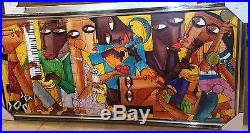
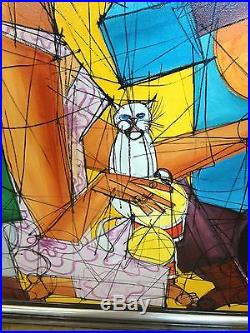
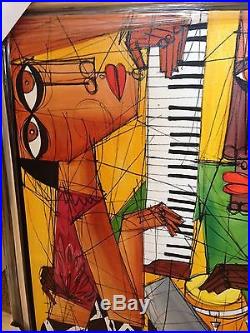
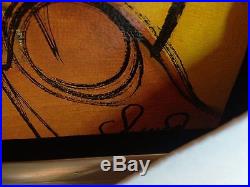
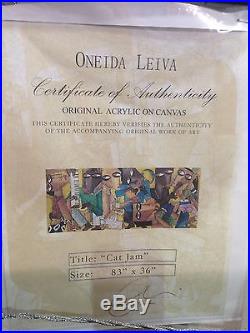

With Love for all our Mothers! Original acrylic on canvas. Wood frame size 91 inches by 44 inches. Painting size is 83 by 36 inches. It was recently framed. Is an exceptionally diverse cultural blend of African, South American, European and North American design, reflecting the diverse demographic makeup of the island. Cuban artists embraced European. And the early part of the 20th century saw a growth in Cuban. Movements, which were characterized by the mixing of modern artistic genres. After the Cuban Revolution of 1959, Cuban artists became more isolated from the anti-establishment artistic movements of the United States and Europe. Though artists continued to produce work in Cuba, many pursued their careers in exile. While some artists felt it was in their best interests to leave Cuba and produce their art, some artists stayed behind, either happy or merely content to be creating art in Cuba, which was sponsored by the government. Because it was state sponsored, an implied censorship occurred, since artists wouldn’t want to make art that was against the revolutionary movement as that was the source of their funding. It was during the 1980s in which art began to reflect true uninfluenced expression. The “rebirth” of expression in Cuban art was greatly affected by the emergence of a new generation of Cuban. This generation did not remember the revolution directly, nor did they feel angst from having not been a larger part in forming the nation. By the late 1970s, many of the graduates of the school of the arts in Cuba, “the Facultad de Artes Plasticas of the Instituto Superior de Arte” (founded in 1976) were going to work as schoolteachers, teaching art to young Cubans across the island. This gave a platform for the graduates to be able to teach students about freedom of expression. This meant freedom of expression in many forms including medium, message, and style of art. It was this new level of experimentation and expression that was able to enable the movement of the 1980s. The 1960s and 1970s saw the introduction of. Shifting emphasis away from craftsmanship to ideas. This often means the elimination of an object in art production; only an idea is stated or discussed. It requires an enhanced level of participation by the patron (interactive participation or a set of instructions to follow). Mingled together to expand the very definition of “what art is”. In Cuba, these new developments along with Photo Realism, naturally synthesized through the Afro-Cuban sensibility and emerged as The New Art, an art movement widely recognized in Cuba as Cuban. Young artists born after the revolution rebelled against modernism and embraced conceptual art amongst other genres. Many would carry on folkloric traditions and Santeria motifs in their individual expressions while infusing their message with humor and mockery. The art took a qualitative leap by creating international-art structured on African views, not from the outside like surrealism but from the inside, alive with the cultural-spiritual complexities of their own existence. In addition to the Christian, predominately Catholic, there are four African Religions continuing to influence culture being practiced in Cuba. (Ewe Fon), and the secret, male only. The African religions operate independently and synthesized with each other and the Christian religions. These charges are the buyers responsibility. Please, check with your countrys custom office to determine their restrictions and prohibitions. We dont mark merchandise values below value or mark items as gifts US and International Government regulations prohibit such behavior. If you need our help in any way, or have a questions, we will do our best to assist you. The item “Oneida Leiva Cat Jam Original acrylic on Canvas Cuba 83X36 Signed” is in sale since Wednesday, May 03, 2017. This item is in the category “Art\Art from Dealers & Resellers\Paintings”. The seller is “aika3311″ and is located in West Palm Beach, Florida. This item can be shipped to United States.
- Original/Reproduction: Original
- Listed By: Owner
- Signed?: Signed
- Medium: Acrylic
- Subject: Figures & Portraits
- Size Type/Largest Dimension: Large (Greater than 30in.)
- Date of Creation: 2000-Now
- Region of Origin: Cuba

Oneida Leiva Cat Jam Original acrylic on Canvas Cuba 83X36 Signed






With Love for all our Mothers! Original acrylic on canvas. Wood frame size 91 inches by 44 inches. Painting size is 83 by 36 inches. It was recently framed. Is an exceptionally diverse cultural blend of African, South American, European and North American design, reflecting the diverse demographic makeup of the island. Cuban artists embraced European. And the early part of the 20th century saw a growth in Cuban. Movements, which were characterized by the mixing of modern artistic genres. After the Cuban Revolution of 1959, Cuban artists became more isolated from the anti-establishment artistic movements of the United States and Europe. Though artists continued to produce work in Cuba, many pursued their careers in exile. While some artists felt it was in their best interests to leave Cuba and produce their art, some artists stayed behind, either happy or merely content to be creating art in Cuba, which was sponsored by the government. Because it was state sponsored, an implied censorship occurred, since artists wouldn’t want to make art that was against the revolutionary movement as that was the source of their funding. It was during the 1980s in which art began to reflect true uninfluenced expression. The “rebirth” of expression in Cuban art was greatly affected by the emergence of a new generation of Cuban. This generation did not remember the revolution directly, nor did they feel angst from having not been a larger part in forming the nation. By the late 1970s, many of the graduates of the school of the arts in Cuba, “the Facultad de Artes Plasticas of the Instituto Superior de Arte” (founded in 1976) were going to work as schoolteachers, teaching art to young Cubans across the island. This gave a platform for the graduates to be able to teach students about freedom of expression. This meant freedom of expression in many forms including medium, message, and style of art. It was this new level of experimentation and expression that was able to enable the movement of the 1980s. The 1960s and 1970s saw the introduction of. Shifting emphasis away from craftsmanship to ideas. This often means the elimination of an object in art production; only an idea is stated or discussed. It requires an enhanced level of participation by the patron (interactive participation or a set of instructions to follow). Mingled together to expand the very definition of “what art is”. In Cuba, these new developments along with Photo Realism, naturally synthesized through the Afro-Cuban sensibility and emerged as The New Art, an art movement widely recognized in Cuba as Cuban. Young artists born after the revolution rebelled against modernism and embraced conceptual art amongst other genres. Many would carry on folkloric traditions and Santeria motifs in their individual expressions while infusing their message with humor and mockery. The art took a qualitative leap by creating international-art structured on African views, not from the outside like surrealism but from the inside, alive with the cultural-spiritual complexities of their own existence. In addition to the Christian, predominately Catholic, there are four African Religions continuing to influence culture being practiced in Cuba. (Ewe Fon), and the secret, male only. The African religions operate independently and synthesized with each other and the Christian religions. These charges are the buyers responsibility. Please, check with your countrys custom office to determine their restrictions and prohibitions. We dont mark merchandise values below value or mark items as gifts US and International Government regulations prohibit such behavior. If you need our help in any way, or have a questions, we will do our best to assist you. The item “Oneida Leiva Cat Jam Original acrylic on Canvas Cuba 83X36 Signed” is in sale since Sunday, April 02, 2017. This item is in the category “Art\Art from Dealers & Resellers\Paintings”. The seller is “aika3311″ and is located in West Palm Beach, Florida. This item can be shipped to United States.
- Original/Reproduction: Original
- Listed By: Owner
- Signed?: Signed
- Medium: Acrylic
- Subject: Figures & Portraits
- Size Type/Largest Dimension: Large (Greater than 30in.)
- Date of Creation: 2000-Now
- Region of Origin: Cuba


 D5 Creation
D5 Creation